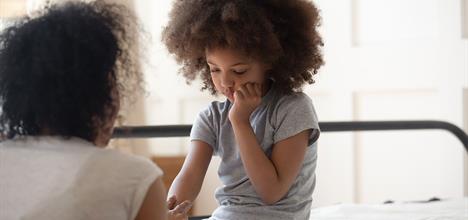
Welcome to The Ministry Lab's curated list of resources to help caregivers and parents engage children in conversations around grief and trauma. Here you'll find:
See also our Contemplative & Mental Health Practices for Children & Youth and/or Hope & Resilience guides for developing self-awareness and tools for navigating distress, anxiety, and trauma.
If you don't find a resource to fit your need, don't hesitate to consult with The Ministry Lab's director, Rev. Emily Meyer, who is happy to assist you.
Minnesota Reformer shared Minnesota Mental Health Professionals Say Climate Concerns Driving Patients to Depression by Christopher Ingraham, January 04, 2024.
Can your congregation become a place for young people to process complex emotions and develop resilience and hope by participating - with adults who are passionate about climate care - in taking action to mitigate damage and restore health to all?
Author Traci Smith offers two free practices to share with children and families in response to Traumatic Current Events
Trauma Stewardship Institute offers several free, downloadable tools, including Decision Fatigue & Cognitive Overload, a Gratitude Log, a Map for Managing One's Day, their Tiny Survival Guide, When Experiencing Overwhelm & Trauma, and a book and gift package selection for people walking through trauma.
 How to Talk With Kids About Tragedies & Other Traumatic News Events
How to Talk With Kids About Tragedies & Other Traumatic News Events
By: David Schonfeld, MD, FAAP
Pastor Lisa at Bedtime Theology wonders why in the United States our preference for talking about death is that we Don't Mention It.
A Biblical Perspective on Trauma featuring Paul Cho
LeaderWise's Sarah Parker, Mdiv, LMFT offers Defining Moments: Tips for Talk with Children about Difficult Current Events
shares Helping Children Cope after a Traumatic Event: A Recovery Guide for Parents, Teachers and Community Leaders - comprehensive guidance for helping children of any age; signs of trauma; and age-by-age how-tos.
Sometimes knowing concrete facts can help you and your children calm down. PBS’s Almanac Public Affairs and COVID-19 Special is available in diverse languages, including Spanish, Hmong and Somali.
offers “stories and advice on raising kind, caring and resilient children”, which includes tips on “how to talk honestly with children about racism”, book recommendations about race and diversity and questions to discover your child’s thoughts, and how to talk to your kids about coronavirus and How You and Your Kids Can De-Stress During Coronavirus. Many resources are broken into specific age brackets and include links to PBS videos that support the conversation.
provides links to resources and intervention sites, along with tips for working with children, teens and families, an entire page of Resources in the Wake of Community Trauma and Beyond, and includes Trauma Resources for Children and Families; contact info for their Mobile Crisis Mental Health Services may be helpful for some families to have on hand.
The National Child Traumatic Stress Network offers webinars and articles that connect with current events, including numerous tips and data for parents and caregivers.
The following self-tests for PTSD and Childhood Trauma can be used to assess parents’ level of stress and/or used to gauge children’s experiences of trauma:
Social Work License Map offers 60 Digital Resources for Mental Health. The extensive list is catalogued both by population/group:
And specific diagnoses:
The UMC's Including Children with Disabilities in the Life of the Church is a wealth of resources, ideas, and practical applications.
In this resource, you will find information about:
Who Is Coming? Identifying Populations
Identifying the Needs of Exceptional Children
Identifying the Needs of Parents and Families
The Basics of Classroom Set-Up
The Basics of Classroom Management
The Basics of Adapting Curriculum and Activities
The Non-Negotiables for Including Those with Disabilities and Their Families
 The MN Conference UCC Faith Formation Resources page includes resources for Talking with Children about Violence and Anti-Racism:
The MN Conference UCC Faith Formation Resources page includes resources for Talking with Children about Violence and Anti-Racism:
The AUCE shares this list of resources for talking with children about Russia's war against Ukraine:
UMC Ministry with Children (fb) includes tips on empowering and listening to children the midst of pandemic and a list of resources for further mental and spiritual health and formation.
The PACER Center (pacer.org, 952-838-9000) is Minnesota’s primary parent resource for navigating the IEP and 504 process. They provide resources and staff to advise parents and professionals regarding their needs. Rev. Stephanie Friant, a member of the Disability Concerns Ministry and volunteer PACER Parent Leader, is trained and available to review IEPs with parents/guardians, assist with IEP meetings, and answer questions from church staff or contacts (815-592-3207, stephanieHfriant@gmail.com).